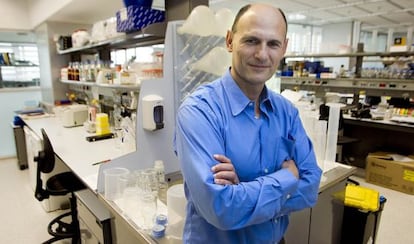Stem cell guru walks out on Spanish science
Juan Carlos Izpisúa is leaving the Barcelona Regenerative Medicine Center due to a lack of support The biochemist has earned numerous awards for his research into organ and tissue development

A world leader in stem cell research is leaving the cutting-edge center he helped create in Barcelona due to a lack of support from the authorities in both Catalonia and Spain.
Juan Carlos Izpisúa, a Spanish biochemist who teaches at the Salk Institute in California and has earned numerous awards for his research into organ and tissue development, had helped found the Barcelona Regenerative Medicine Center (CMRB) in 2004, bringing Spain to the forefront of stem cell research.
But now Izpisúa is resigning from his director's post due to a lack of financial and political support from his two major public sponsors, the government of Spain and the regional government of Catalonia.
Sources in the scientific community are blaming the move on "the cuts, political mediocrity and a lack of empathy from Madrid." They also note that Catalan premier Artur Mas met with Izpisúa 18 months ago and assured him that he would put all available means at his disposal.
Sources in the scientific community are blaming the move on "the cuts, political mediocrity and a lack of empathy from Madrid"
According to sources familiar with the months-long negotiations, the decision to let Izpisúa go originated in the Catalan government, although Madrid did nothing to stop it. The explanation supplied was that, as an undesirable effect of cutbacks, the government was no longer in a condition to keep funding the center "at the quality levels required" by its director.
While his departure will not bring about the immediate closure of the center, the CMRB will lose many of its lines of research, since 18 of the 21 scientific projects it is currently carrying out are the intellectual property of Izpisúa, who will take them with him.
The move also underscores how the crisis has meant further cuts for scientific projects in Spain, which is seeing many researchers move abroad to find jobs and financial support.
Shortly after the crisis hit Spain in 2008, the then-Socialist government announced a shift away from construction as the basis of the country’s economic growth. But so far this has failed to translate into any significant investment in other fields.
Over the last decade, the CMRB has published more than 200 papers, including some seminal work in the emerging field of regenerative medicine. One of Izpisúa's projects, the development of "micro-kidneys" from stem cells, was described by Science magazine as one of the great advances of 2013.
“Research at the center has yielded good results," admits the Catalan director general of Health Planning and Research, Carles Constante, who represents regional authorities on the board of the CMRB. "But now we are envisioning a different phase. Changes are more habitual in research than in other fields. The direction will be left in the hands of Ángel Raya, a world-class researcher in the field, and the center will not close down. We are committed to regenerative medicine and believe that this is an important field, but now we are focusing on a different approach."
While that may be so, what is certain is that Spain has already lost one of the most advanced regenerative medicine research centers in the world, even if a building in Barcelona will maintain its name on the wall for a few months more.
Tu suscripción se está usando en otro dispositivo
¿Quieres añadir otro usuario a tu suscripción?
Si continúas leyendo en este dispositivo, no se podrá leer en el otro.
FlechaTu suscripción se está usando en otro dispositivo y solo puedes acceder a EL PAÍS desde un dispositivo a la vez.
Si quieres compartir tu cuenta, cambia tu suscripción a la modalidad Premium, así podrás añadir otro usuario. Cada uno accederá con su propia cuenta de email, lo que os permitirá personalizar vuestra experiencia en EL PAÍS.
¿Tienes una suscripción de empresa? Accede aquí para contratar más cuentas.
En el caso de no saber quién está usando tu cuenta, te recomendamos cambiar tu contraseña aquí.
Si decides continuar compartiendo tu cuenta, este mensaje se mostrará en tu dispositivo y en el de la otra persona que está usando tu cuenta de forma indefinida, afectando a tu experiencia de lectura. Puedes consultar aquí los términos y condiciones de la suscripción digital.









































